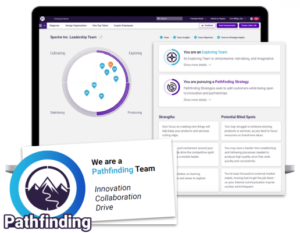
What is Team Discovery by The Predictive Index?
Unlock the full potential of your team with data-driven insights from Team Discovery™, helping you build a cohesive, high-performing unit aligned with your strategic goals.
Reading Time: 9 minutes
In the rapidly evolving world of life sciences, leadership is more than just a title or a role. It’s a responsibility, a duty, and above all, a journey. A journey filled with discoveries, breakthroughs, and challenges that demand not just technical acumen, but also a deep understanding of oneself.
Welcome to the world of self-awareness, an often overlooked, yet powerful facet of great leadership.
If leadership is the ship guiding the life sciences sector through the unpredictable waters of innovation and change, self-awareness is the compass. It enables leaders to understand their strengths, acknowledge their weaknesses, and navigate their responses to various situations. It provides the insight needed to foster a positive and productive work environment, driving both individual and organisational growth.
The power of self-awareness in leadership extends beyond the realm of theory. It’s a practical, actionable tool, a transformative process that every leader can and should integrate into their leadership strategy. So, let’s embark on this journey together, exploring the concept of self-awareness, its impact on leadership, and how you, as a leader in life sciences, can harness its power to propel your leadership from good to great.
Stay with me as we delve deeper into the world of self-awareness, and discover how good leaders become great leaders.
To truly grasp the transformative power of self-awareness, we first need to understand what it really means. Self-awareness is the conscious knowledge of one’s own character, feelings, motives, and desires. It’s like holding up a mirror to your inner self, acknowledging not just what you see, but also understanding how it shapes your actions, decisions, and interactions with others.
Now, you may ask, why is self-awareness so crucial for leaders, especially those navigating the complex and dynamic field of life sciences?
Firstly, the life sciences sector is one that thrives on innovation and progress. It’s a field where every decision has the potential to impact countless lives and shape the future of healthcare. In such a high-stakes environment, leaders need to be acutely aware of their decision-making processes. They need to understand their biases, their decision-making patterns, and how their actions can influence their team and the larger organisation.
Secondly, self-awareness fosters empathy and emotional intelligence, essential qualities for effective leadership. Leaders who are self-aware can better understand the needs, motivations, and emotions of their team members, facilitating better communication, fostering trust, and ultimately leading to a more engaged and productive team.
The importance of self-awareness in leadership isn’t just theoretical. It’s backed by extensive research and hard data. A study published by Cornell University’s School of Industrial and Labor Relations found that leaders with high levels of self-awareness were associated with higher organisational effectiveness and profitability. Another report by the Korn Ferry Institute found that public companies with higher rates of return also employ professionals who exhibit higher self-awareness.
These findings underscore the undeniable link between self-awareness and successful leadership, particularly in a field as demanding and dynamic as life sciences.

Allow me to introduce you to Dr. Jane Foster, a senior executive at a leading biotechnology firm. Dr. Foster, a brilliant scientist with numerous patents to her name, found herself grappling with leadership challenges when she was promoted to head a key research division. Despite her technical prowess, she felt a disconnect with her team, leading to missed deadlines, communication breakdowns, and, most importantly, a decline in team morale.
Recognising the need for change, Dr. Foster embarked on a journey of self-awareness. She took the time to introspect and critically analyse her actions, motivations, and responses. She sought feedback from her team members and peers, welcoming perspectives that offered insights into her leadership style.
One critical revelation was her tendency to drive her team based on her own high standards and pace, often overlooking the diverse capabilities and motivations of her team members. She realised she was more task-focused than people-focused, leading to a breakdown in communication and a lack of empathy.
With these insights, Dr. Foster made conscious changes. She began by fostering an open dialogue within her team, encouraging feedback, and making efforts to understand each team member’s unique motivations and challenges. She also worked on her emotional intelligence, developing her ability to empathise and respond effectively to her team’s needs.
The impact of these changes was transformative. The team’s performance improved, morale was boosted, and Dr. Foster found her stride as a leader. But more importantly, she created an environment where each team member felt valued, understood, and motivated to contribute their best.
Dr. Foster’s journey underlines the power of self-awareness in leadership. It’s a testament to the transformative effect that understanding oneself can have, not only on a leader’s effectiveness but on the overall health and productivity of their team.

You May Also Be Interested In
Job descriptions are more than just laundry lists of responsibilities and requirements—they’re a goldmine of information. They are your first glimpse into the employer’s mind, giving you insight into what they truly value and expect from the ideal candidate.
Imagine if you had a tool that could provide insights into your deepest motivations, your work style, and how you interact with others. A tool that helps you understand not just who you are as a leader, but why you are the way you are. This is where the Predictive Index Behavioral Assessment comes into play.
The Predictive Index Behavioral Assessment is a scientifically validated tool designed to uncover the core behaviours and motivating needs of an individual. It measures four primary characteristics: dominance, extraversion, patience, and formality. These elements come together to provide a comprehensive understanding of a person’s workplace behaviour.
Here’s how it works: The assessment is a free-choice, stimulus-response tool that measures a person’s motivating drives and needs. In simple terms, it asks you to select adjectives that you feel describe the way you are expected to behave, and then those that you believe really describe you. The comparison of these two sets of adjectives provides rich insights into your workplace behaviour and motivations.
Why is it a valuable tool for developing self-awareness? The power of the Predictive Index lies in its ability to reveal the ‘why’ behind our actions. It goes beyond skills and experiences to uncover the underlying motivators that drive our behaviour. For leaders, this knowledge is invaluable. It enables them to understand their own leadership style better, identify areas of strength, and pinpoint areas that need development.
In a fast-paced, complex sector like life sciences, where effective leadership can be the difference between success and failure, the Predictive Index Behavioral Assessment serves as a critical tool in a leader’s arsenal, enabling them to navigate their leadership journey with greater self-awareness and confidence.
Unlocking the power of self-awareness through the Behavioral Assessment is like getting a roadmap to your leadership journey. It illuminates your path, revealing not just where you are, but also where you could go. Let’s delve into how leaders can use this tool to gain insights and enhance their leadership effectiveness.
When leaders take the Behavioral Assessment, they’re provided with a detailed report that outlines their behavioural pattern. This pattern reflects their natural leadership style, including how they prefer to work, make decisions, and interact with others. It’s akin to a mirror, reflecting who you are as a leader in the context of your work.
But it doesn’t stop at self-reflection. These insights can be actively used to enhance leadership effectiveness. Here’s how:
In the dynamic and ever-evolving life sciences sector, leadership is not just about the knowledge you possess, but how you leverage that knowledge. And it all begins with self-awareness. By applying the insights gained from the Behavioral Assessment, leaders can embark on a journey of continuous self-improvement, becoming not just good, but great leaders.
Let’s bring this to life with an example – meet Dr. Jane Reynolds, a brilliant scientist turned leader in the life sciences sector. Jane was a trailblazer in her field, but when she transitioned into leadership, she found the terrain unfamiliar and challenging.
Jane’s team respected her immense knowledge, but they found her leadership style a bit distant and inflexible. Jane, on her part, found it hard to understand why her approach wasn’t working. She needed a mirror to reflect her leadership style, and that’s where the Predictive Index Behavioral Assessment came into play.
After taking the Assessment, Jane discovered that her behavioral pattern was primarily analytical and formal. While this explained her scientific brilliance, it also illuminated why her team found her distant. Jane realized that she needed to adapt her leadership style to be more inclusive and open.
Armed with these insights, Jane began to make changes. She consciously worked on being more approachable, initiating regular check-ins with her team members, and encouraging open dialogue. She also began to delegate more, trusting her team to take on tasks she would have otherwise handled herself.
The transformation was remarkable. Her team began to feel more valued and heard, leading to increased engagement and collaboration. The team’s productivity and morale improved significantly, as did their respect for Jane. What’s more, Jane herself felt more fulfilled in her role as a leader. She had not only gained a better understanding of her team but also of herself.
This case study demonstrates the transformative power of self-awareness in leadership. Using the Predictive Index Behavioral Assessment, Jane was able to gain invaluable insights into her leadership style and make changes that positively impacted her team and her own leadership journey.

Leadership in the life sciences sector is a demanding yet rewarding journey. As we’ve explored, a key component of that journey is self-awareness. This isn’t just an abstract concept; it’s a tangible skill that can be developed and honed, leading to significant improvements in leadership effectiveness and team performance.
We’ve looked at the Predictive Index Behavioral Assessment, a powerful tool that provides leaders with insights into their behavioural patterns. Understanding these patterns can illuminate why certain approaches work and others don’t, helping leaders adapt and grow.
We’ve also seen, through the examples of real-life leaders, how this self-awareness can transform leadership experiences. From understanding our own tendencies to recognising how these tendencies can impact others, the journey of self-awareness can be a game-changer for any leader.
So, if you’re a leader in the life sciences sector and want to become more self-aware, why not take the next step? The Predictive Index Behavioral Assessment is a great starting point. It’s not just about self-improvement; it’s about transforming the way you lead and positively impacting your team and your organisation.
Every great leader is a work in progress, and every step towards greater self-awareness is a step towards becoming a better leader. So, take the leap and embark on your self-awareness journey today. If you’re interested in taking the Predictive Index Behavioral Assessment or would like more information, don’t hesitate to reach out. Your journey towards becoming a great leader starts here.
You May Also Be Interested In
It's not about chasing talent; it's about attracting it. The landscape of the life sciences industry is a competitive one. With the pace of scientific and technological advances, companies need to stay on their toes to keep up. But the heart of every life sciences company isn't its technologies or products; it's its people.
360 Talent Solutions Ltd is an Associate Partner of Humanostics® , a PI Certified Partner authorised to use the science, assessment software, and curriculum of management workshops of The Predictive Index.
In partnership with Humanostics, we provide companies in the UK and across Europe access to the assessment tools provided by The Predictive Index.
Take the 6-minute PI Behavioral Assessment™ today. Once you have completed the 6-minute assessment, I will send you a Full Behavioral Report by Predictive Index.
From supporting the growth of leading pharma companies over the past 10 years, I have learnt that when it comes to predicting future performance, technology is key:
For me, hiring without the use of psychometric assessments is like trying to put together a jigsaw puzzle with pieces missing … and no picture on the box. It’s not fun, it takes longer, and when you are almost finished, you realise you have pieces missing.
Take the assessment today and start measuring more to improve your recruitment.
If you are interested in learning more or are ready to incorporate behavioral data into your recruitment process, please contact me today, I will be happy to help.
Let’s get started!
Dave Crumby
Founder at 360 Talent Solutions
Certified Predictive Index Practitioner

Unlock the full potential of your team with data-driven insights from Team Discovery™, helping you build a cohesive, high-performing unit aligned with your strategic goals.

Explore how ‘MY PI: Using Science to Transform Your Workplace’ leverages behavioural science to revolutionise HR practices, offering in-depth insights, practical tools, and a vibrant community for HR professionals.

Join The Swiss Talent Optimisation Hub (STOH) to connect with HR professionals dedicated to leveraging Predictive Index tools and behavioural science to overcome unique challenges faced by Swiss businesses and drive organisational success.

Discover how Swiss companies can optimise their hiring and talent management strategies with the Predictive Index, a powerful tool that enhances workforce insights and decision-making, supported by Humanostics and 360 Talent Solutions.
| Cookie | Duration | Description |
|---|---|---|
| cookielawinfo-checbox-analytics | 11 months | This cookie is set by GDPR Cookie Consent plugin. The cookie is used to store the user consent for the cookies in the category "Analytics". |
| cookielawinfo-checbox-functional | 11 months | The cookie is set by GDPR cookie consent to record the user consent for the cookies in the category "Functional". |
| cookielawinfo-checbox-others | 11 months | This cookie is set by GDPR Cookie Consent plugin. The cookie is used to store the user consent for the cookies in the category "Other. |
| cookielawinfo-checkbox-necessary | 11 months | This cookie is set by GDPR Cookie Consent plugin. The cookies is used to store the user consent for the cookies in the category "Necessary". |
| cookielawinfo-checkbox-performance | 11 months | This cookie is set by GDPR Cookie Consent plugin. The cookie is used to store the user consent for the cookies in the category "Performance". |
| viewed_cookie_policy | 11 months | The cookie is set by the GDPR Cookie Consent plugin and is used to store whether or not user has consented to the use of cookies. It does not store any personal data. |